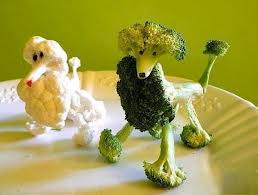
 Dear Hand in Hand
Dear Hand in Hand
My son is the pickiest eater I have ever met. Everything has to be completely unblemished and his food cannot have touched anything else that might discolor it.
On top of this, he will eat almost only white food!
I don't want to force food on to him, or make eating a traumatic experience, but I would like to get more nutrients in him than pasta and bagels. Is his behavior normal? Or is there perhaps a psychological issue underlying here?
Thanks,
Mom of Avoidant Eater
Dear Mom of AE
In my experience, prolonged fussiness about certain foods, or their look and smell, are not necessarily related to the foods. They are more about underlying anxiety.
Your son's symptoms–the strong aversion to certain foods–is so riveting and concerning that it gets all of your attention and worry, while the underlying fear goes untouched and so you find the picky eating doesn't budge.
You can't pour honey on a fear, or dress it up, or talk a child out of it. A fear is a feeling, and no logic or trick can pry a feeling out of a child. What we can do is to get a feeling moving so that the child has some room to change his behavior and be open to new things.
Try This: Three-step plan to help your picky eater
![]() First, give him Special Time often. This is a tool where a parent offers closeness and attention to do just what the child wants to do. Special Time is limited by a timer that ticks until his Special Time is over. During that time, the parent doesn't advise, doesn't teach, doesn't say what will be played or how it will be played.
First, give him Special Time often. This is a tool where a parent offers closeness and attention to do just what the child wants to do. Special Time is limited by a timer that ticks until his Special Time is over. During that time, the parent doesn't advise, doesn't teach, doesn't say what will be played or how it will be played.
Instead, just follow your child's lead and offer warmth and extra eye contact during the time.
How Special Time Works
What Special Time does is to “warm up” the child's sense of support and closeness you. If he's going to face some fears and come through that more confidently, he needs your direct, warm attention.
Be delighted in whatever he chooses to do, and when it's over, give him a big hug and tell him when the next Special Time will be. Aiming for once a day is a great goal.
Tears After Playtime
Often, at the end of Special Time, your child might find a way to be upset.
 Maybe he says he doesn't want Special Time to end. Maybe he says that he only wants to sit in THIS chair, not THAT chair for dinner. Maybe he says that one food touched another food, and then gets upset.
Maybe he says he doesn't want Special Time to end. Maybe he says that he only wants to sit in THIS chair, not THAT chair for dinner. Maybe he says that one food touched another food, and then gets upset.
Surprisingly enough, this is because his time basking in your attention has increased his sense of safety. He feels comfortable enough to let you in.
The next thing I'm going to ask of you might be difficult: Allow the upset. When children cry and tantrum, they are doing something highly worthwhile. This can be a hard notion for us to comprehend because we've been told otherwise for so many years, but crying and tantrums are like a release valve for fear and upset. This space is where your son's fears will begin to move and lift.
![]() When it happens, move in close, and do what we call Staylistening.
When it happens, move in close, and do what we call Staylistening.
Stay and listen but don't try to argue or be reasonable.
You can expect to hear a lot of his “unreasonable” feelings pouring out, but this is healthy. If you can pour in your caring and your support as he cries, this will help him.
Be as calm as you can. Take your voice right down. You don't have to say much. It will help him immensely if you can show that you don't think the sky will fall because Special Time is over, or because someone else sat in THIS chair that he wants, or because the peas touched his potatoes.
“I know, I know sweetheart,” is enough.
Once you've been through a few cycles of this, you'll begin to see change, and you'll both be more comfortable heading to the table.
One last idea:
![]() A little playlistening can go a long way to lightening the situation. A game that works great with picky eaters is when you pretend, with great flourish, to be a picky eater. You examine your food, make faces and noises, hold it up and drop it back on your plate, and go “Eeeewwwww!” with a twinkle in your eye. Laughing will also help him release some of his fear and aversion.
A little playlistening can go a long way to lightening the situation. A game that works great with picky eaters is when you pretend, with great flourish, to be a picky eater. You examine your food, make faces and noises, hold it up and drop it back on your plate, and go “Eeeewwwww!” with a twinkle in your eye. Laughing will also help him release some of his fear and aversion.
Getting to the bones of picky eating is a process, but it works! Try these ideas, play with them, and let us know how it goes.
-Juli Idleman
 Revolutionize the way you parent. Read this post about our Five Listening Tools.
Revolutionize the way you parent. Read this post about our Five Listening Tools.
Discover the different ways you can use Special Time in our free video series. You’ll get a step-by-step guide to using Special Time and some fun examples of what it can look like. Get your videos now.
Get our newsletter for monthly tips on advice for calmer more confident parenting.